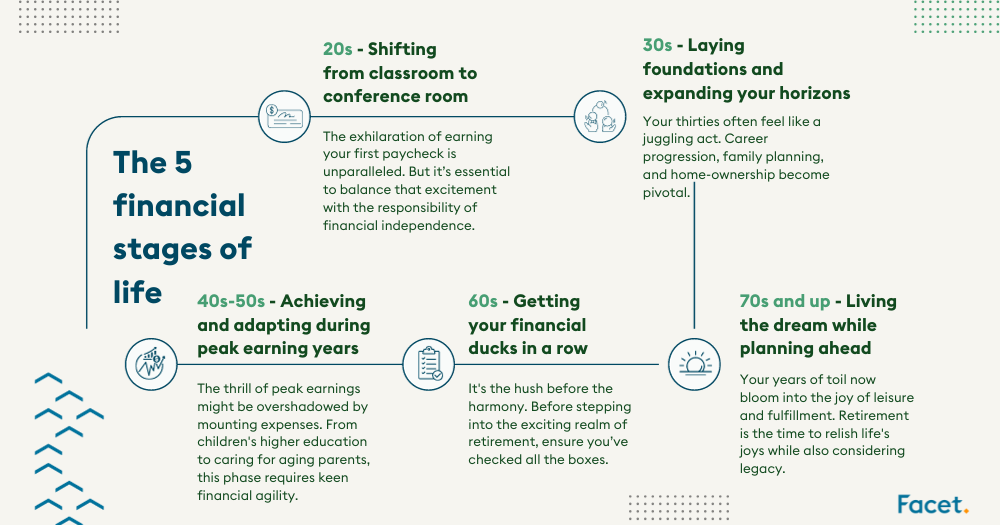
The information provided is based on the published date.
Key takeaways
- Financial wellness is about navigating unique financial challenges and seizing opportunities through every stage of life
- In your 20s, establish a strong financial foundation with an emergency fund, retirement savings, employee benefits, and managing student loans
- Your 30s are a time to grow wealth by making smart investments and focusing on retirement savings
- During your 40s-50s, diversify your investments and optimize tax strategies to prepare for future expenses
- The 60s involve evaluating retirement readiness and planning for Social Security & pension strategies
- Retirement in your 70s+ involves keeping tabs on withdrawal rates, estate planning, portfolio review, and making appropriate adjustments
TABLE OF CONTENTS
Financial wellness is not just about accumulation; it’s about navigation. Every life stage presents its unique financial challenges and opportunities.
Life’s financial landscape is ever-changing, evolving with every major milestone.
While some of us have experienced firsthand the challenges of buying a home or saving for retirement, many others are still navigating these uncharted territories.
To bring these life stages and their financial implications to life, we’ll introduce fictional anecdotes throughout this article.
These stories aim to illuminate the real-world implications of each financial decision and provide a relatable context for our guidance.
Whether you’re just starting your career or in the golden years of retirement, there’s something here for you.
Let’s delve into the financial nuances of each of life’s significant phases.

20s - The shift from classroom to conference room
Moving from the cozy cocoon of student life to the bustling world of “real life” is invigorating yet daunting.
Key financial moves
The exhilaration of earning your first paycheck is unparalleled. But it’s essential to balance that excitement with the responsibility of financial independence. Don’t think of your first paycheck as just money; view it as a ticket to financial freedom.
Establish a solid foundation by creating an emergency fund, jumpstarting your retirement savings, familiarizing yourself with your employee benefits, and tackling your student loans head-on.
Starting Out: Sophia’s Journey
Sophia landed her first job right out of college with an entry-level salary of $65,000. She felt a mix of excitement and apprehension as she moved into a shared apartment in the city. Growing up, her parents didn’t discuss finances much, so everything felt new and slightly overwhelming.
After seeking advice from a CFP® Professional, she decided to allocate 15% of her monthly paycheck to savings, which amounted to roughly $800 each month.
Sophia was determined to make a dent in her student loans, so she dedicated another 15% towards them. The remaining 70% covered her rent (which she split with 3 roommates), groceries, utilities, transport, and occasional treats.
She was keenly aware that this initial spending plan would shift as her life and priorities changed, but it felt good to have a starting point.
Key insights
The financial habits you establish in your twenties play a crucial role in shaping your financial future. It’s important to approach this pivotal time in your life with a sense of awareness, empathy, and practicality. By setting smart financial habits now, you’re paving the way for a more secure and prosperous future.
30s - Laying foundations and expanding your horizons
Your thirties often feel like a juggling act. Career progression, family planning, and homeownership become pivotal.
Key financial moves
Smart investing is crucial now. With more work experience under your belt, you’re in a better position to understand the potential of investing and wisely allocate your funds.
Learn all you can about mortgages if buying a home is on the horizon. If you have kids, start saving for their education and reassess your insurance needs (especially life and health) as your family grows.
It’s also crucial to start increasing your retirement savings in plans like 401(k)s and IRAs. Aiming to save 15% of your household income is recommended, although it may not be achievable for everyone. If you are unable to reach this target, consider committing to a 1% increase and gradually adjusting it every six to twelve months.
Growing a Family: Raj and Anika's Experience
Both in their early 30s, Raj and Anika were thrilled to find out they were expecting twins. They had stable jobs, with a combined annual income of $150,000. They knew children were expensive, but twins? They started planning immediately. After researching, they estimated an initial outlay of $25,000 for the first year to cover medical expenses, baby essentials, and increased monthly expenses.
This meant setting aside roughly $2,100 each month. They decided to cut back on vacations and dining out, reallocating 17% of their income towards baby-related costs. To be better prepared, they also started contributing to a 529 Plan for the twins’ future college education.
Key insights
During your 30s, making short-term trade-offs can pave the way for long-term gains. It’s a time when you can focus on practical strategies that yield lasting benefits, all while acknowledging the challenges and empathizing with the journey ahead.
Now is the time to use your newfound financial stability to grow your wealth. Taking calculated risks with investments can pay off if done right.
(40s-50s) Achieving and adapting during your peak earning years
The thrill of peak earnings might be overshadowed by mounting expenses. From children's higher education to caring for aging parents, this phase requires keen financial agility. Now is the time to strike a balance between the two.
Key financial moves
Diversify your investments and optimize tax strategies. As your kid’s college expenses loom closer, ensure you’re well-prepared. Revisit retirement goals regularly. Consider creating a long-term care plan to ensure quality care and asset protection down the road. Keep a close eye on your spending and plan for unexpected costs.
Ramping up retirement savings: Miguel’s Story
Miguel, a 52-year-old marketing executive, began thinking seriously about retirement when he saw his parents struggle in their later years. He had always contributed to his 401(k), but now he wanted to ramp up his savings.
On an annual salary of $175,000, he opted to max out his 401(k) contributions at $30,000 (the limit for those 50 and older in 2023).
Additionally, Miguel decided to max out his Roth IRA ($7,500 annually for those over 50 in 2023). The goal was to accumulate enough to live comfortably, travel, and pursue his passions of painting and photography in retirement.
Key insights
Balancing today’s needs with tomorrow’s dreams is the defining act of financial maturity in your 40s and 50s. Walking this tightrope might be challenging, but well worth it once you reach your destination.
(60s) Getting your financial ducks in a row
It's the hush before the harmony. Before stepping into the exciting realm of retirement, ensure you’re genuinely ready.
Key financial moves
Evaluate your retirement readiness. Perhaps it’s time to downsize. Optimize your pension and Social Security strategies.
Retirement readiness: Maria and Veronica’s Path
Maria and Veronica, both in their early 60s, dreamed of a carefree retirement filled with travel and hobbies. Realizing they needed to scrutinize their finances, they considered downsizing their family home to boost their savings.
After consulting their financial planner, they learned about optimizing their pensions and maximizing Social Security benefits. Deciding to allocate 40% of their savings for travel, 25% for healthcare, 20% for emergencies, and the remaining 15% for other expenses, they took the leap and moved into a cozy condo near their children.
This strategic decision not only padded their nest egg but also reduced their monthly costs. By proactively addressing their finances, the couple smoothly transitioned into their eagerly anticipated retirement.
Key insights
The decisions you make in your 60s hold significant sway over the quality of your retirement. It’s important to realize that these choices can have a profound impact on your future well-being.
When it comes to pre-retirement planning, there’s no one-size-fits-all approach. Every individual’s situation is unique.
However, by carefully considering your options and making informed decisions based on your circumstances, you can ensure you’ll have the best chance at a comfortable retirement.
(70s and beyond) Living the dream while planning ahead
Your years of toil now bloom into the joy of leisure and fulfillment. Retirement is the time to relish life's pleasures while also considering your legacy.
Key financial moves
Keep tabs on your withdrawal rates to ensure your savings last. Consider estate planning, gifting, and legacy planning. Make sure to review your portfolio with your planner and adjust it for the right risk level.
Extending wealth and enjoying every minute: John and Carla’s next act
In their early 70s, John and Carla cherished their retirement years. John, a former engineer, and Carla, a nurse, had pensions, Social Security benefits, and savings that provided them an annual income of $120,000.
Desiring a comfortable life and the chance to leave a legacy for their grandchildren, they consulted a financial planner. Based on the advice, they adopted a 4% withdrawal rate from their retirement savings, amounting to $30,000 each year.
This strategy, coupled with their other income sources, allowed them to enjoy their hobbies, support their grandchildren now and then, and take trips they’d always dreamed of.
Key insights
Retirement isn’t the end of financial planning; it’s the beginning of legacy planning. With smart planning and the right income strategy, anyone can enjoy retirement while ensuring a secure financial future for generations to come.
Final word
In the tapestry of life, money intertwines with dreams, goals, and aspirations. Facet’s philosophy resonates deeply with this journey, understanding that every financial decision impacts a broader life narrative.
Unbiased, personalized, and genuinely affordable financial advice isn't just about numbers; it's about ensuring you make the most of every facet of life – from the milestones to the everyday moments.
Are you ready to embark on a financial journey tailored just for you?
Schedule a free introductory call today, and let us be the compass in your financial voyage.









